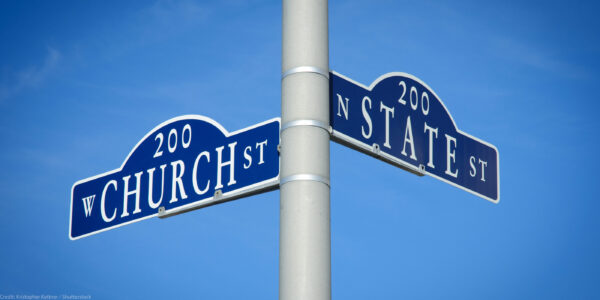
At a time of rising anti-Muslim rhetoric and discrimination, communities nationwide are coming together to push back. This is the fifth in a blog series titled "Faith Under Fire," which is meant to highlight this fight for equality and religious freedom.
Libraries and schools are supposed to be inclusive spaces for learning, growing, and tolerance. But two women last week — one in California, one in D.C. — learned these safe spaces do not always live up to their reputation.
On Wednesday, a library officer reportedly asked a woman to remove her hijab at a branch of the D.C. public library. When she refused, and although someone next to her tried to speak up on her behalf, the officer threatened her with handcuffs if she did not leave. So she left.
To their credit, library officials removed the officer from that branch, apologized, and are investigating the incident. But it should never have happened in the first place.
On the same day, 3,000 miles away, a 13-year-old girl met with her school to discuss persistent bullying because of her hijab. The bullying apparently escalated last week when a boy asked the seventh-grader if she was a terrorist, and then pulled at her hijab. While she had refrained from wearing her hijab in previous years to avoid bullying, she decided this year to don it again in a show of pride and self-expression. But the harassment has caused her so much stress that she wants to be homeschooled next year.
Discrimination and harassment based on a person’s religious garb is unacceptable and often illegal. Muslim women do not have to remove their headscarves except under very specific circumstances and should never be targeted for expressing their faith. To make clear their rights in a variety of situations, the ACLU has just released a Know Your Rights guide for women and girls who wear hijab.
As the guide explains, women in public do not have to remove their headscarves, even in many places that typically ask people to remove hats or head coverings. For instance, after denying entrance to a woman wearing a hijab, a bank in Nebraska recently revised its security policy to clarify that religious headwear would be permitted. Under Nebraska law, a bank is considered a place of public accommodation and may not discriminate against customers based on their religious appearance. Employers must also provide a requested accommodation for Muslim women who wear hijab or headscarves unless the accommodation would cause the employer an undue hardship, such as a safety risk. Similarly, the law prohibits public schools and public facilities, such as libraries, from banning hijabs or headscarves if they allow other head coverings like hats or baseball caps. And public schools must take action to stop repeated harassment of students based on their religious garb or faith.
Although the guide is not a substitute for legal advice, we hope it provides a basic understanding of the rights Muslim women and girls have to wear hijab and practice and express their religious identity in a variety of situations.
Unfortunately, the effects of anti-Muslim rhetoric and discrimination are not just limited to those who wear hijab. (Just take a look at our interactive map of anti-mosque incidents nationwide to get a very disturbing picture.) For that reason, we have developed guides for Muslims in many different contexts, from the workplace to interactions with law enforcement. We also have a fact sheet specifically for Muslim women.
It is a sad reality that a girl may be driven away from her school or a woman from her local library because people react so negatively to her faith. But if enough people stand together against discrimination, we can ensure that these spaces remain inclusive for people of every religion.
Read the previous posts in this series:
FBI Borrows From Anti-Muslim Playbook in New Video Game
I Am a Muslim American Army Reservist Who Was Turned Away From a Gun Range Because of My Faith

